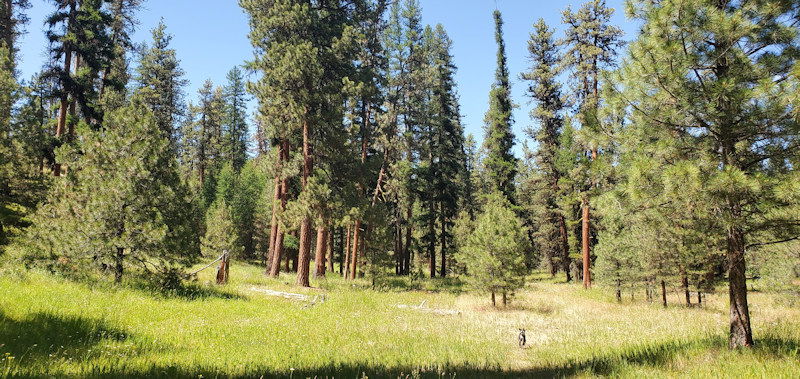Conservation groups hail settlement of lawsuit to protect Ochoco Forest riparian areas from logging

PENDLETON, Ore. (KTVZ) -- A federal judge on Monday approved a settlement between Central Oregon LandWatch, Oregon Wild and the U.S. Forest Service to exclude sensitive riparian habitat from a proposed logging project in the Ochoco National Forest, the two conservation groups announced.
On April 20, LandWatch and Oregon Wild filed a lawsuit challenging the Ochoco National Forest’s Black Mountain project out of concern for protecting elk habitat, clean water, and wetlands from logging.
A decision was issued late last year on the Black Mountain Vegetation Management Project, covering about 34,000 acres adjacent to Big Summit Prairie and the southern portion of the Bridge Creek Wilderness, about 35 miles east of Prineville.
"The project, which proposed extensive logging and development of new roads, would have been dire for sensitive environments along streams, wetlands, and other riparian areas," according to the conservation groups' announcement of the settlement, which continues in full below (we have reached out to the Ochoco National Forest for any comment):
Logging in sensitive riparian areas is particularly harmful to fish and wildlife as it dramatically decreases water quality and habitat complexity. Preventing logging in these areas also maintains soil stability and shade, preserving the cool, moist, and secure areas that Rocky Mountain elk need to breed and raise their young.
During the planning stages of this project, Central Oregon LandWatch and Oregon Wild submitted comments asking the Forest Service to avoid the most sensitive riparian areas. Recognizing the benefits to fisheries of protecting riparian areas, the Forest Service adopted the Inland Native Fish Strategy (INFISH) in the 1990s to restrict riparian logging in most circumstances. The Ochoco National Forest’s management plan also requires special protections for elk habitat in riparian areas.
LandWatch and Oregon Wild repeatedly offered to work with the Forest Service to identify and protect the most critical areas, but the Forest Service moved ahead with the project—proposing hundreds of acres of riparian logging activities. With logging activities imminent, LandWatch and Oregon Wild took the Forest Service to court to hold the agency accountable to its own rules restricting logging along stream corridors, wetlands, and elk calving and rutting grounds.
At the eleventh hour, just before the case was to be argued before the U.S. District Court, the Ochoco National Forest came back to the negotiating table. LandWatch once again asked the forest to rescind its authorization of logging in the most critical riparian areas, and this time, the Forest Service agreed.
LandWatch and Oregon Wild said they celebrate the settlement agreement signed Monday by U.S. Magistrate Judge Patricia Sullivan in Pendleton (document link below) as a success in their efforts to protect elk habitat, clean water, and wetlands from logging in the Ochoco National Forest.
According to LandWatch’s Executive Director Ben Gordon, “This settlement, which prevents the logging of critically important elk habitat and streamside buffers, ensures the Ochocos will remain a refuge for wildlife who desperately need an intact environment to weather the impacts of climate change and prolonged drought.”
Marilyn Miller, a professional environmental consultant and LandWatch member, believes that vitally important wildlife habitat should be excluded from timber projects.
"I’m grateful to see streams, wetlands, and wildlife in the Ochocos protected. This agreement keeps chainsaws and log trucks away from the most sensitive riparian areas in the Black Mountain project area, including fish-bearing streams and calving and rutting habitat for Rocky Mountain elk," Miller said.
“For too long, the Ochoco National Forest has been a place where logging and OHVs trump other values, putting its important trout, big game, clean water, and traditional recreation opportunities at risk,” said Jamie Dawson, Oregon Wild’s Public Lands Campaigner. “We're grateful that the Forest Service has agreed to follow the laws that safeguard these values here. However, it's clear that the Ochocos need a longer-term vision and stronger legislative protection to truly protect the things that make this landscape special.”
Central Oregon LandWatch and co-plaintiff Oregon Wild were represented by Crag Law Center in federal court and throughout the settlement process. LandWatch will continue to hold strong to its values to protect wildlife, waterways, and wild places. LandWatch and Oregon Wild look forward to continuing to work with the Forest Service to ensure that the best habitat on the Ochocos remains protected.